
Poker is a card game that requires skill and strategy to win. It’s also a great way to develop your problem-solving skills and improve your mental health. Poker can help you learn to be patient and make decisions based on logic, rather than emotions. It can also teach you to manage risk well, which is a valuable skill in any environment.
There are many different games of poker, but all involve betting in some way. The first player to act places a bet and all players must call or raise in turn. This means that if you have a weak hand, it’s often better to fold than try to bluff your way out of the pot.
If you play poker often, you will quickly learn to work out odds in your head. This may seem trivial but it will greatly improve your decision-making at the tables. Poker can also teach you to think strategically about how to structure a pot and determine the likelihood that your opponents have certain hands.
Another good way to improve your poker skills is to talk about the hands you have played with other winning players. However, you need to be careful who you choose to discuss these hands with, as not all players are able to offer good advice. You want to find people who are winning at the same stakes as you and who have a good understanding of how to play the game.